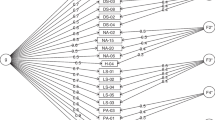Abstract
The issue has been raised previously that the use of the correlation or squared correlation as an estimate of determination depends on the type of model that is considered (Ozer, 1985). We identify three models of subjective well-being and show that the respective estimates of determination require different interpretations of the correlation statistic. The differences are illustrated using data from the Newfoundland Longitudinal Study of Aging. (NLSA).
Similar content being viewed by others
References
Atkinson, T.: 1982, ‘The stability and validity of quality of life measures’, Social Indicators Research 10, 112–132.
Bowers, K. S.: 1973, ‘Situationism in psychology: An analysis and critique’, Psychological Review 80, 307–336.
Costa, P. T. and McCrae, R. R. 1984, ‘Personality as a lifelong determinant of wellbeing’, in C. Z.Malatesta and C. E.Izard (eds.), Emotion in adult development (Sage, Beverly Hills, CA).
Costa, P. T., Zonderman, A. B., McCrae, R. R., Cornoni-Huntley, J., Locke, B. Z., and Barbano, H. E.: 1987, ‘Longitudinal analyses of psychological well-being in a national sample: Stability of mean levels’, Journal of Gerontology 42, 50–5.
Deiner, E.: 1984, Subjective well-being, Psychological Bulletin 55, 542–75.
Fordyce, M. W.: 1988, ‘A review of research on happiness measures: A sixty second index of happiness and mental health’, Social Indicators Research 20, 355–82.
Kammann, R., Farry, M., and Herbison, P.: 1984, ‘The analysis and measurement of happiness as a sense of well-being’, Social Indicators Research 15, 91–115.
Kozma, A. and Stones, M. J.: 1980, ‘The measurement of happiness: Development of the Memorial University of Newfoundland Scale of Happiness (MUNSH)’, Journal of Gerontology 35, 906–12.
Kozma, A. and Stones, M. J.: 1983, ‘Predictors of happines’, Journal of Gerontology 38, 626–28.
McNeil, J. K., Stones, M. J., and Kozma, A.: 1986, ‘Subjective well-being in later life: Issues concerning measurement and prediction’, Social Indicators Research 18, 35–70.
Michalos, A. C.: 1986, ‘An application of multiple diecrepancy theory (MDT) to Seniors’, Social Indicators Research 18, 349–63.
Moun, T.: 1988, ‘Yea-saying and mood-of-the-day effects in self-reported quality of life’, Social Indicators Research 20, 117–40.
Nunnally, J.: 1967, Psychometric Theory, (McGraw-Hill, New York).
Ozer, D. J.: 1985, ‘Correlation and the coefficient of determination’, Psychological Bulletin 97, 307–15.
Palmore, E. B. and Kivett, V.: 1977, ‘Change in life satisfaction: A longitudinal study of persons ages 46–70’, Journal of Gerontology 32, 311–16.
Rosenthal, R. and Rubin, D. B.: 1982, ‘A simple, general purpose display of magnitude of experimental effect’, Journal of Educational Psychology 74, 166–69.
Steiger, J. H. and Ward, L. M.: 1987, ‘Factor analysis and the coefficient of determination’, Psychological Bulletin 101, 471–74.
Stones, M. J. and Kozma, A.: 1980, ‘Issues relating to the usage and conceptualization of mental health constructs employed by gerontologists’, International Journal of Aging and Human Development 11, 269–81.
Stones, M. J. and Kozma, A.: 1986a, ‘Happiness and activitives as propensities’, Journal of Gerontology 41, 85–90.
Stones, M. J. and Kozma, A.: 1986b, ‘“Happy are they who are happy ...” A test between two causal models of relationships between happiness and its correlates’, Experimental Aging Research 12, 23–9.
Stones, M. J. and Kozma, A.: (1989), ‘Happiness and activities in later life: A propensity formulation’, Canadian Psychology 30, 526–37.
Author information
Authors and Affiliations
Rights and permissions
About this article
Cite this article
Stones, M.J., Kozma, A., Hannah, T.E. et al. The correlation coefficient and models of subjective well-being. Soc Indic Res 24, 317–327 (1991). https://doi.org/10.1007/BF00383732
Received:
Issue Date:
DOI: https://doi.org/10.1007/BF00383732




